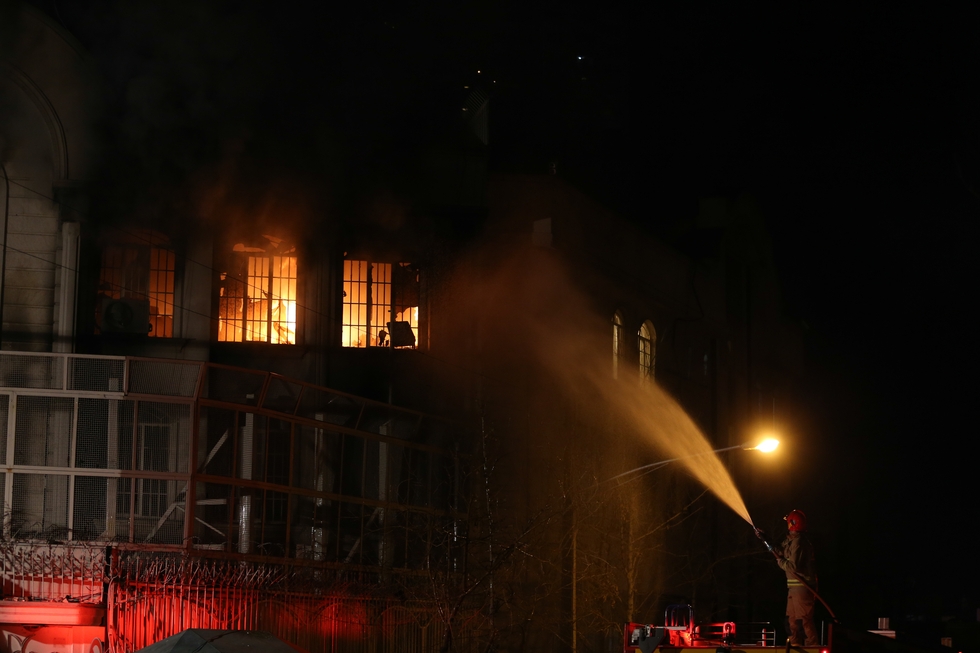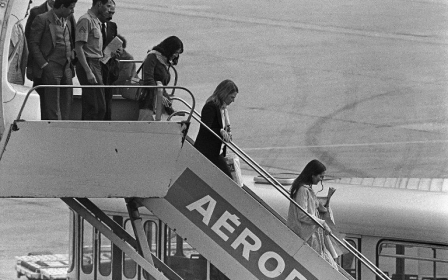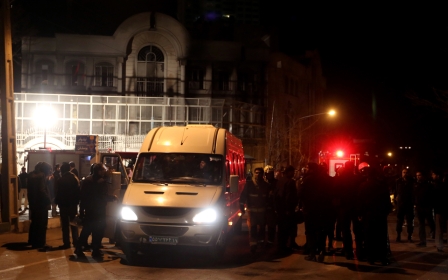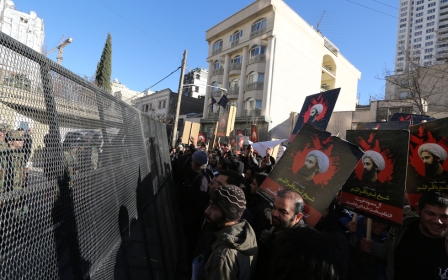Why Iran and Saudi Arabia need to slam on the brakes

Tensions between Iran and the Arab world – not just Saudi Arabia – are spiralling out of control. The execution of the prominent Shia cleric Sheikh Nimr al-Nimr by the Saudi government and the subsequent eruption of anger in Iran, the largest Shia country in the world, marked by the unwarranted assault by a mob of hardliners on the Saudi Embassy in Tehran and its consulate in northeastern city of Mashhad, has resulted in a dismal diplomatic rupture distancing Iran from the Arab world further.
In response to the violent attack on the Saudi diplomatic offices in Iran, in which the fanatics – described by President Hassan Rouhani as "a group of headstrongs"– caused destruction to the embassy and consulate and set the former on fire using Molotov cocktails, Riyadh severed its diplomatic relations with Iran. The decision was followed with similar actions by Bahrain, Sudan and Djibouti.
There were reports that the UAE also downgraded its diplomatic ties with Iran; perhaps it didn’t replicate the Saudi pattern of severing the ties altogether because of the strong presence of Iranian businessmen in Dubai and the close trade ties between the two countries. Kuwait recalled its ambassador from Tehran, in what was believed to be a downgrading of the ties; however, the Iranian ambassador to Kuwait, Alireza Enayati denied the reports and said it was simply an invitation by the Kuwaiti government to consult their ranking diplomat in Tehran about the worrying developments.
The Tehran-Riyadh relations have been declining seriously since April last year when two Saudi guards at the Jeddah airport sexually harassed two Iranian teenage boys. They were sentenced to 1,000 lashes and four years in prison by the criminal court in Jeddah, but it wasn’t sufficient to appease the Iranians, and the Ministry of Culture suspended all Umrah flights to Saudi Arabia. Around 500,000 Iranians undertake Umrah every year.
The troubled ties were worsened in September 2015 after 465 Iranians died in a tragic stampede on the final day of the Hajj rituals in the Mina neighbourhood of the holy city of Mecca, an incident that claimed at least 2,411 lives. Iranian officials vehemently reacted to the disaster, accusing the Saudis of mismanagement and incompetence in securing the safety of pilgrims. There were hundreds of casualties from such countries as Mali, Nigeria, Egypt, Bangladesh, Indonesia and India, but the most vocal, fierce reaction came from Iran, which was already dismayed at the Saudis over their role in Syria and in Yemen.
The renewed rivalry between Iran and Saudi Arabia, which is marring Iran’s relations with the entire Arab world, brings to mind the xenophobic sentiments between Persians and Arabs that fluctuated throughout their shared history. In mor recent decades, Iranians and Arabs have been exchanging fire, referring to each other using pejorative and derogatory terms and using every opportunity to deliver a blow to the other side. A case in point is the Iraq-Iran war in the 1980s, when most Arab countries in the region – save for Syria – sided with Baghdad in the face of the Iranian Islamic Revolution.
However, Iranians and Arabs are simply ignoring the crucial point that both of them were, and still are, the essential pillars of the Muslim world, and their corrosive enmity would simply serve to undermine Islamic unity and solidarity, imparting this embarrassing message to the rest of the world that a handful of major Muslim countries are unable to maintain cohesion and cooperate peacefully.
Ironically, 28 European countries, which were mostly pitted against each other during two world wars in a split-to-pieces continent, have put aside their differences, formed a strong alliance through the European Union and many of them are involved in a collective military partnership under the auspices of NATO to defend each other in the event that any of them faces foreign aggression.
Of course the infringement of a throng of hardliners upon the Saudi diplomatic compounds in Tehran and Mashhad was the most disturbing and repugnant scene that could emerge. It was so inexcusable that almost all the major Iranian officials, both moderate and conservative, including President Rouhani, his deputies and spokesman, parliamentarians and even a major IRGC official condemned it unequivocally and called for the prosecution of the perpetrators. Brigadier General Mohsen Kazemeini of the Islamic Revolutionary Guards Corps called the attack an "ugly, unjustifiable act".
There’s no reason to defend the indefensible, and it seems like we the Iranian people are once again paying the price for the relentlessness and intractability of those who still have plans for inflicting damage on the nation’s economy, foreign policy and above all, international reputation – after eight years of ultimate control over all the essential decision-making centres during Mr Mahmoud Ahmadinejad’s tenure as president.
However, the Saudis also shouldn’t have taken the rushed, unpremeditated decision of cutting off their diplomatic ties with Iran overnight, obviously because it further escalates instability in an already volatile Middle East and adds fuel to the fire of sectarianism and rejuvenates the Persian-Arab hostility of 1,400 years ago, absolutely detrimental to both peoples.
Moreover, the Saudis shouldn’t have instigated a campaign of mass divestment from Iran by prodding the other Arab nations to take hostile action against Tehran. There was no point for Bahrain and Sudan to sever their relations with Iran. It complicates things for both sides and deprives the ordinary people of economic, cultural and social opportunities. While Iran and Saudi Arabia had been practicing some temperance to engage in multilateral talks over the future of horror-stricken Syria, the suspension of diplomatic relations seemingly kills those chances, raising the concerns that the civil war in Syria will persist interminably.
I was disappointed to read a column by the Al-Arabiya English chief editor Faisal J Abbas, entitled "By cutting ties with Iran, Saudi Arabia executed the 48th terrorist". Accusations against Iran run as a perennial thread through the article. Mr Abbas alleges that Iran has been sponsoring terrorism and tormenting its own people brutally, and is a safe haven for Al-Qaeda! Regardless of the verifiability of those claims, it’s so sorrowful that this noted Arab journalist and many other public figures like him in the Arab world think about Iran so pessimistically. A blame game and convicting each other of the crimes of which we are ourselves already accused won’t help settle our differences.
Iran accuses Saudi Arabia of sponsoring and financing ISIS in Syria, and the Saudis retaliate by accusing Iran of fanning the fire of sectarian conflict in the Middle East. Is an exchange of accusations and blaming each other ad infinitum a solution to realise peace and stability?
In these tense times when all the Muslims worldwide, whether Iranian, Turk, Arab, Indian, Pakistani or European, face the terrifying menace of Islamophobia, deportation from their countries of residence, blasphemy, visa revocation, boarding denial at the airports, racial profiling, and of course a serious enemy as Donald Trump and people who think, like him, that all the Muslims should be barred from entering the United States, it’s better that Iran and Saudi Arabia slam on the brakes, diffuse the tensions and build on their numerous cultural, historical and religious bonds instead of working to defame and try each other in a public courtroom.
-Kourosh Ziabari is an award-winning Iranian journalist and media correspondent. He is staff writer with Iran Review and a reporter with the California-based Fair Observer. He has also contributed to Huffington Post, Your Middle East, International Policy Digest, Gateway House and Tehran Times.
The views expressed in this article belong to the author and do not necessarily reflect the editorial policy of Middle East Eye.
Photo: Iranian protesters set fire to the Saudi Embassy in Tehran during a demonstration against the execution of prominent Shia Muslim cleric Nimr al-Nimr by Saudi authorities, on 2 January, 2016 (AFP).
New MEE newsletter: Jerusalem Dispatch
Sign up to get the latest insights and analysis on Israel-Palestine, alongside Turkey Unpacked and other MEE newsletters
Middle East Eye delivers independent and unrivalled coverage and analysis of the Middle East, North Africa and beyond. To learn more about republishing this content and the associated fees, please fill out this form. More about MEE can be found here.





